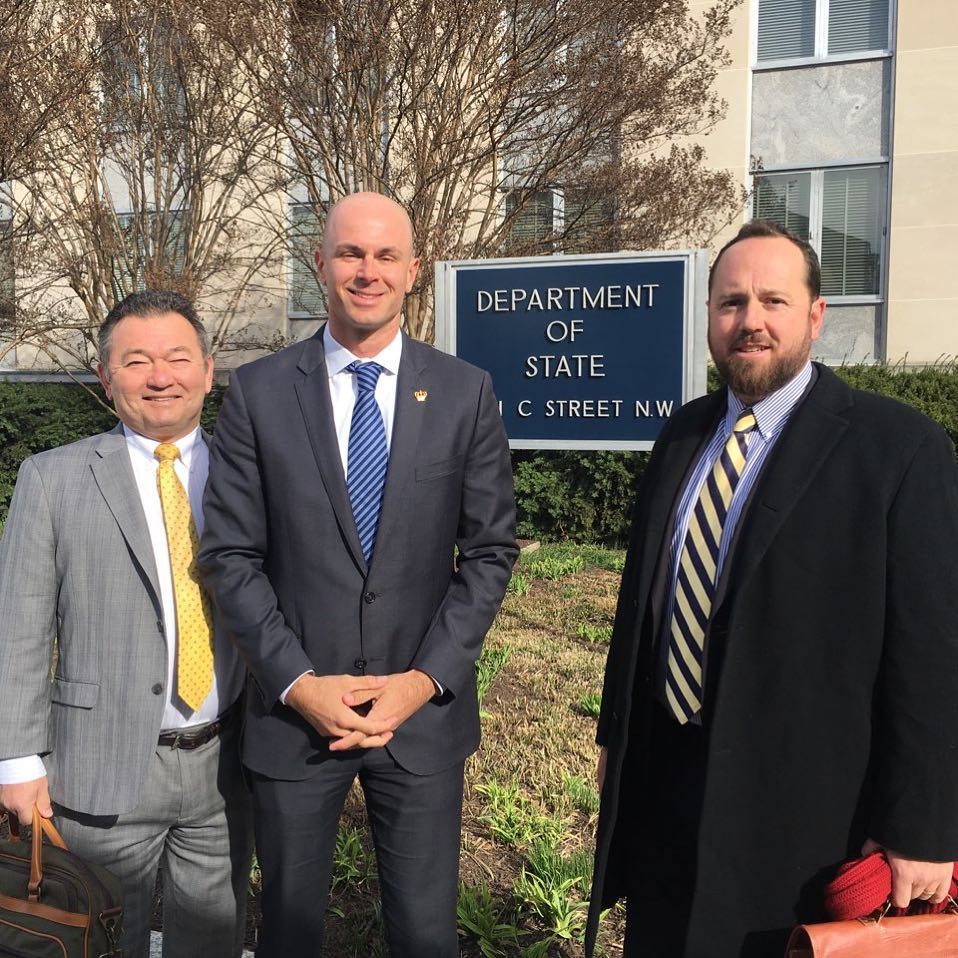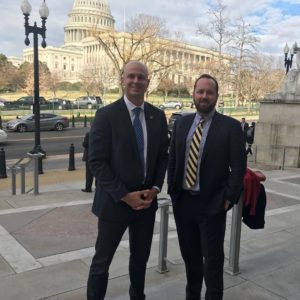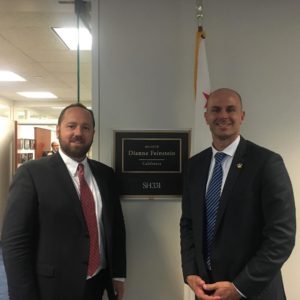
Three of Coronado’s city leaders headed to Washington, DC last week to advocate for a solution to the ongoing sewage spills emanating from Mexico and closing down beaches in the San Diego region. Mayor Richard Bailey, City Manager Blair King, and Councilman Whitney Benzian made their voices heard in meetings at multiple agencies and with numerous officials.
The first morning started with meetings at the US State Department with representatives from the Justice Department, State Dept, and IBWC. The conversations focused on the resources available to Mexico to help address the issue, upgrades they are currently making to their infrastructure, and tools the US government can exercise to hold them accountable.
Although Mexico is apparently now willing to discuss the issue, a break from the last precedent, and resources do exist, primarily through the North American Development Bank, the fact remains that there is little the US can do at the moment to compel them to act according to the State Department.
After the early morning meetings with the various agencies concluded, meetings began with our San Diego congressional delegation to discuss what we can do on our side of the border. Our approach centered around two strategies: first, identifying specific fixes to our local issue and second, expanding the issue to include other border states. International sewage spills are not unique to the San Diego region and we have found other Congressional representatives interested in reforming the IBWC. It is possible that fixes and reforming the IBWC could be included in the same bill. There have been numerous studies done over the years which have identified possible infrastructure solutions and there is currently a study from the Government Accountability Office specifically reviewing the IBWC operations. This approach would allow us to expand our list of supporters from the San Diego delegation to the other border states: New Mexico, Texas, and Arizona.
The bill sponsored by Congressmen Vargas and Issa, HR 3795, received the most attention during the talks on Capitol Hill.
Two major concerns were brought up. 1) the bill is currently barebones and will need more specifics in terms of specifying funding levels and solutions. These are easily addressable based on studies already completed. 2) the willingness of House leadership, currently held by Republicans, to consider the bill. This is where it becomes critical to have bipartisan support. Fortunately, Congressman Issa has briefed House leadership about the bill.
Generally, the Congressmen and their staffers are supportive and do not believe there will be much, if any, opposition. The challenge will be to line up enough support from congressmen outside of the border area.
Thursday kicked-off with a meeting at the Pentagon followed by meetings on Capitol Hill and finally at the Environmental Protection Agency. Our request to the Pentagon was to elevate our local concerns over the sewage spills to the State Department. The US State Department can directly apply pressure to the IBWC and we believe they are more likely to do so if the Department of Defense brings up the issue directly. Additional subjects were discussed, including base traffic queuing on our residential streets and the resources available for relocating the gates further onto base. They also mentioned the possibility of a pedestrian underpass to connect under SR 75.
After the Pentagon, they met with South Carolina Congressman Joe Wilson. Mr. Wilson is likely to be the next Chairman for the Foreign Affairs committee – a committee that the Vargas-Issa bill was referred to. The purpose of this meeting was to get this issue on the Congressman’s radar. Mr. Wilson has strong ties to the military as his children serve in various branches. This was the first he learned of the situation and, in his words, the situation was “completely unacceptable.” Mr. Wilson is close with Congressman Vargas and could be a strong voice for the bill. Next up was Senator McCain’s office, followed by Senator Feinstein. The message from Senator McCain’s office was clear, Arizona is equally as frustrated with the performance of the IBWC as we are in Southern California. IBWC is responsible for several sewage treatment plants in the border states from California to Texas. This is where an opportunity to broaden our coalition outside of San Diego can come. Arizona and the other three border states have expressed an interest in reforming the IBWC to create greater oversight and improve their operations. This additional oversight and direction will likely only materialize with congressional action which makes having a broad coalition that much more important.
The last meeting of the trip was a visit with the Environmental Protection Agency (EPA). The conversation was very informative. For one, we learned that a pot of money often cited by congressional offices as a potential source of funding to build the necessary infrastructure, the Border Environment Infrastructure Fund, is not one that our projects would ever be eligible for. The second major takeaway was that the EPA Secretary Pruitt is very aware of the situation. Secretary Pruitt’s Senior Advisor, Ken Wagner, was in the meeting and expressed the Secretary’s desire to “lean in” on this issue specifically to develop a resolution. Mr. Wagner will be in San Diego later this month and offered to make himself available for future meetings.






